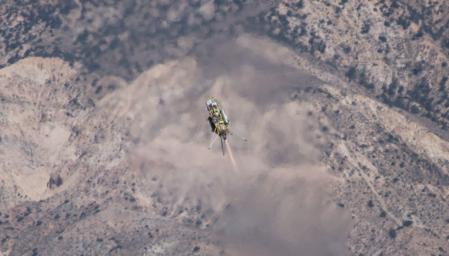
|
Masten Xombie for Testing of JPL Spacecraft-Landing Algorithm
- Click the image above for a larger view
- Full-Res JPEG (2495 x 1424) (333.1 kB)
- Full-Res TIFF (2495 x 1424) (10.7 MB)
Caption:
A Xombie technology demonstrator from Masten Space Systems, Mojave, Calif., ascends from its pad at Mojave Air and Space Port on a test for NASA's Jet Propulsion Laboratory. The vehicle is a vertical-takeoff, vertical-landing experimental rocket. It is being used in collaboration with NASA Dryden Flight Research Center to evaluate performance of JPL's Fuel Optimal Large Divert Guidance (G-FOLD), a new algorithm for planetary pinpoint landing of spacecraft.
NASA Dryden also aided development of Curiosity's "sky crane" landing system by conducting two series of pre-launch flight tests of its landing radar, the first under a helicopter in 2010 and a follow-on series with the radar housed in a Quick Test Experimental Pod mounted under the wing of a Dryden F/A-18 in June 2011. The 2011 tests focused on the on-chute acquisition portion of the Mars Science Laboratory's entry into the Martian atmosphere, when the spacecraft was suspended from its parachute. Data collected from the flights were used to finesse the mission's landing radar software to ensure that it was calibrated as accurately as possible prior to Curiosity's landing.
For more on flight tests of Curiosity's landing radar, visit http://www.nasa.gov/topics/solarsystem/features/F-18_flying_msl_radar.html .
Background Info:
JPL, a division of the California Institute of Technology, Pasadena, manages the Curiosity project for NASA's Science Mission Directorate, Washington. For information about Curiosity's accomplishments over the past year, visit http://mars.jpl.nasa.gov/msl .
Cataloging Keywords:
| Name | Value | Additional Values |
|---|---|---|
| Target | Mars | |
| System | ||
| Target Type | Planet | |
| Mission | Mars Science Laboratory (MSL) | |
| Instrument Host | Curiosity Rover | |
| Host Type | Rover | |
| Instrument | ||
| Detector | ||
| Extra Keywords | Atmosphere, Color, Radar | |
| Acquisition Date | ||
| Release Date | 2013-08-12 | |
| Date in Caption | ||
| Image Credit | NASA/Masten | |
| Source | photojournal.jpl.nasa.gov/catalog/PIA17086 | |
| Identifier | PIA17086 | |
